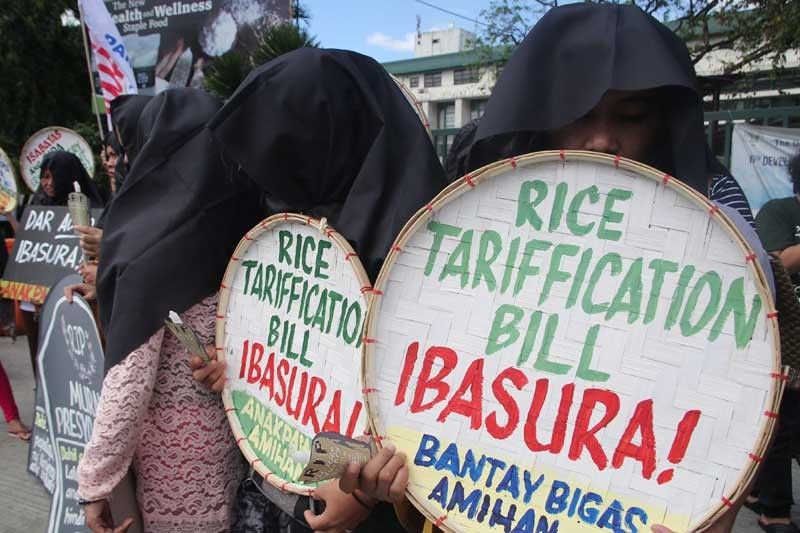NFA employees going to Supreme Court

MANILA, Philippines — Workers of the National Food Authority are exhausting legal options before the Supreme Court (SC) following the enactment of the rice import liberalization law, which threatens the jobs of about 4,000 employees of the NFA.
NFA Employees Association central office president Maximo Torda said the signing of Republic Act 11203 or the Rice Import Liberalization law would mean the removal of thousands of employees as well as the main functions of the agency.
“We are now contemplating to file a case before the (SC) for the violation of our security of tenure right because close to 100 percent of the employees are permanent and career government workers,” Torda said at a briefing yesterday.
“On the part of rank and file employees of the NFA, the passage of the law will lead to the eventual abolition of the NFA as its main function will also be removed,” he warned.
Under the law, which was signed last week, the NFA will be limited to buffer stocking for calamities and emergencies and will not be allowed to import to stabilize rice prices.
NFA officer-in-charge administrator Tomas Escarez also turned emotional during the so-called Black Monday protest.
“I saw the hardships of our employees and it just saddens me that this is not being realized by our economic planners,” Escarez said.
The NFA has created a change management team for the transition period until the agency’s structure is defined in the implementing rules and regulations (IRR) of RA 11203.
As this developed, the interagency NFA Council is fast-tracking the draft of the IRR, which would finalize the functions and limitations of the NFA.
RA 11203 provides for 90 days for the IRR to be completed.
“We have to abide by the IRR. The President has already spoken,” Escarez said.
In the meantime, it is business as usual at the NFA as it continues to buy palay or unhusked rice from farmers at P20.70 per kilogram, even as farm gate prices are now down to P14 to P15 per kilo.
“Whatever role will be given to us, we must accept wholeheartedly and change gears. Buffer stocking and local procurement are still major responsibilities that require a lot of manpower and logistics,” Escarez said.
‘Emmanuel Piñol should resign’
Several peasant groups yesterday picketed the Department of Agriculture (DA), which they claimed failed to protect rice farmers and local agriculture.
Kilusang Magbubukid ng Pilipinas (KMP) joined consumer watchdog Bantay Bigas, peasant women organization Amihan and Anakpawis party-list in calling for Agriculture Secretary Emmanuel Piñol to resign over his department’s failure to achieve rice sufficiency and protect rice farmers from tariffication.
“Flashback to 2016, Secretary Piñol then boasted that he will achieve rice self-sufficiency in two years by 2018. His targets were adjusted to 2019 and then to 2020. Last week, President Duterte signed the rice tariffication law that totally abandons rice farmers and efforts to achieve rice self-sufficiency. We hold Piñol and President Duterte accountable for this situation,” said KMP chairman Danilo Ramos.
“The policy of massive rice importation will only worsen the situation of the local rice industry and agriculture. It will kill the livelihood of 31 million rice farmers, farm workers in rice farms and their families. It will also burden millions of rice-eating Filipinos with higher rice prices in the long-run,” Ramos said.
Critics free to question law
Malacañang said critics of the rice tariffication law are free to question it before the court as it assured the public that the measure has safeguards for farmers who may be affected by the influx of imported rice.
Under the law, private firms may import rice once they secure the necessary permit from the Bureau of Plant Industry and pay 35 percent tariff for shipments from Southeast Asian countries.
It will also establish a P10-billion rice competitiveness enhancement fund to protect the livelihood of local farmers.
Critics fear that the law will create rice cartels and will kill the livelihood of more than two million farmers.
“Regardless of the confidence or not of the Palace, the Palace welcomes any move from any sector questioning any act of the government. That is democratic process in work,” presidential spokesman Salvador Panelo said yesterday at a press briefing. – With Rhodina Villanueva
- Latest
- Trending





























